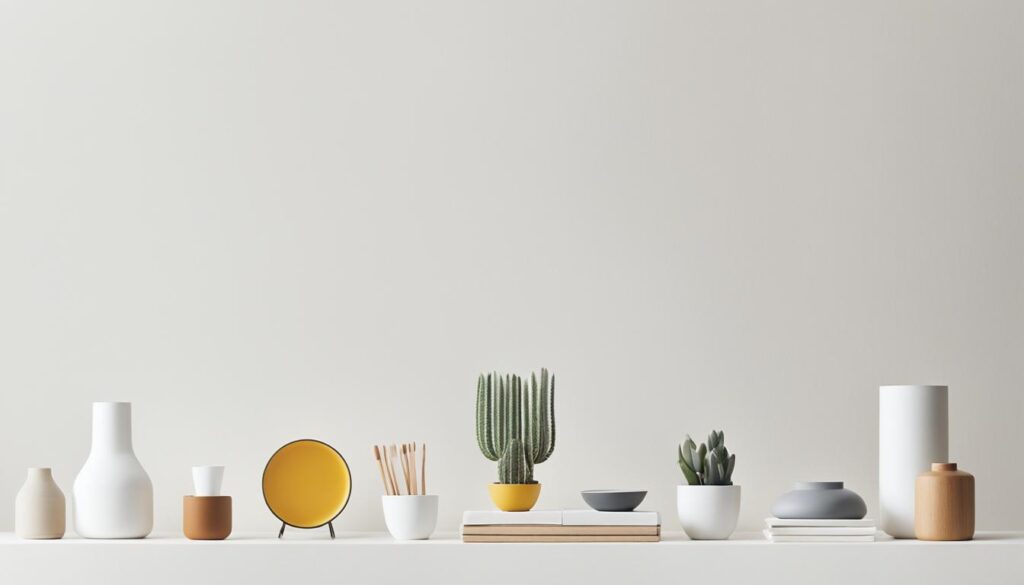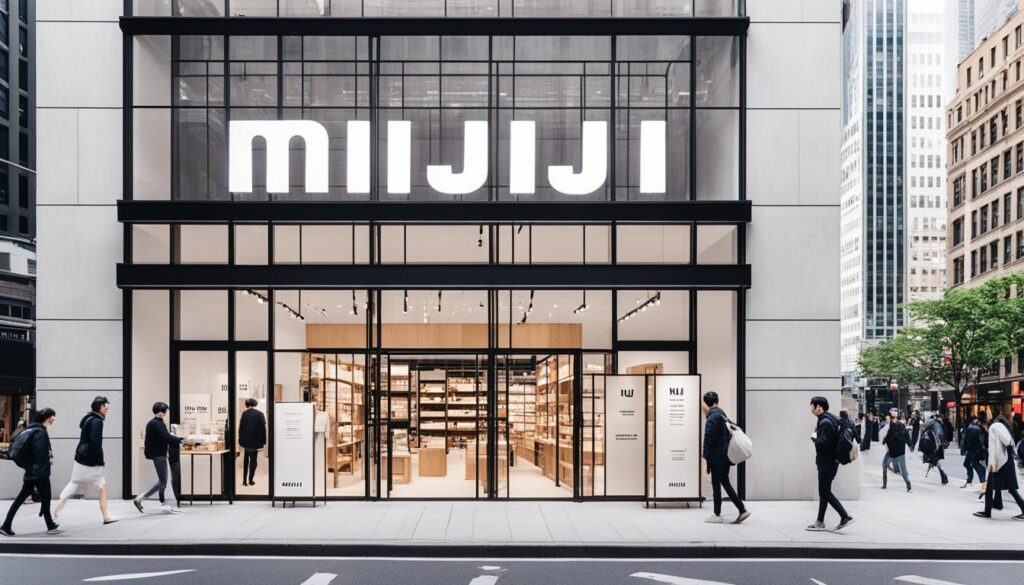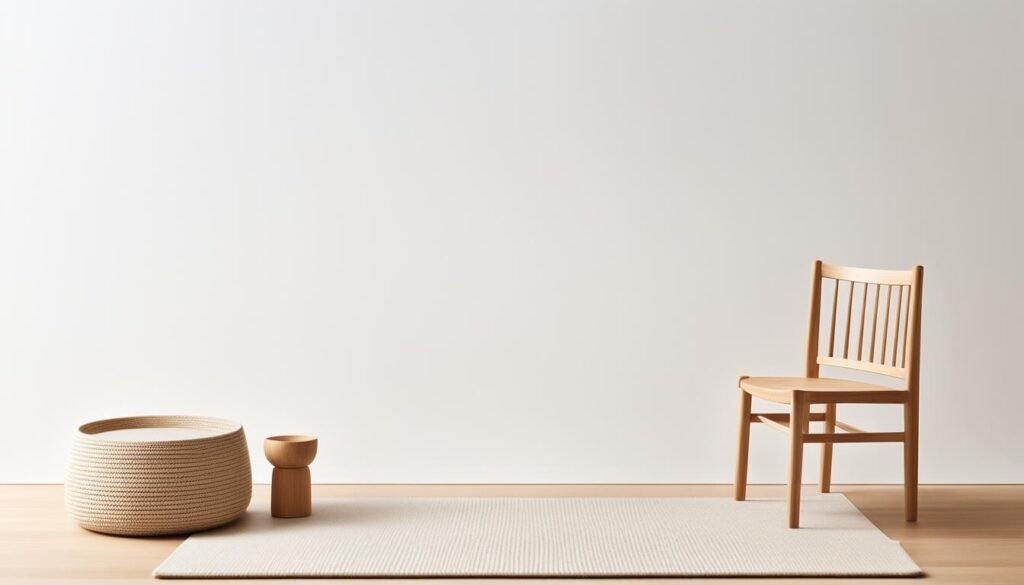In the early ’80s, a Japanese retail company named MUJI started. It is known for keeping design simple and useful. Their philosophy is all about minimalism. They make products that are easy to use and look good.
MUJI’s goal is not just about good looks. It’s also about using resources well and keeping waste low. This way, they can offer great products at low prices. They choose materials and techniques carefully to make sure customers get value for their money.
MUJI’s items don’t have big logos or branding. This ‘no brand’ approach lets the products shine on their own. They believe in quality over showing off a brand.
MUJI works with top designers and artists. Naoto Fukusawa’s designs, like the Wall-Mounted CD Player, made MUJI famous. His Chair/Bed Set shows how MUJI values both looks and practical use. Kenya Hara’s book highlights MUJI’s focus on simple and beautiful design.
Now, MUJI is well-loved around the world with over 700 stores. They sell things for the home, furniture, clothes, and office items. Their approach to design attracts many people. They broke into the US market a decade ago and have been growing since then. In places like Brooklyn, they’ve opened new stores.
Key Takeaways:
- MUJI’s concept revolves around simplicity and functionality in design.
- They promote a “no brand” approach, with products that lack logos or clear brand representation.
- Collaborations with renowned designers like Naoto Fukusawa showcase MUJI’s dedication to functional elegance.
- Their global expansion and extensive product range highlight the appeal of their design philosophy.
- MUJI’s commitment to simplicity and functionality in design drives their success and continuous growth.
The Philosophy of MUJI: Foundations in Minimalism and Ethics
At its core, MUJI’s philosophy relies on two main pillars: minimalism and ethics. These values drive the brand’s products and choices. MUJI believes in making things simple, functional, and reducing what’s not necessary. This way, they aim to bring a deeper meaning to everyday items for their customers.
Minimalism in design focuses on simplicity. It uses clean lines, empty spaces, and basic colors. This design choice makes things easy to understand by taking out what’s not needed. People are drawn to this clear and honest way of presenting items.
Research shows that most people, about 78%, prefer products with simpler designs. They think these products are more real and honest. This shows how choosing minimalism can impact what people buy. People value simplicity when choosing what to buy.
Another key aspect for MUJI is being ethical. They care about how their products are made and their effects on the planet. Thinking about the environment is a big deal for MUJI. Since many young consumers, about 84% of them, look for eco-friendly items, MUJI’s approach is important. They focus on making products that not only meet needs but also care for the earth.
MUJI also changes how people feel about prices and quality. They believe in offering greatness at fair prices. This idea was new in Japan because luxury items from the West were seen as better because they were more expensive. MUJI, however, showed that quality doesn’t have to be expensive. They proved that good materials, not just a high price, make a product valuable.
By focusing on being simple and ethical, MUJI has carved out a special place for itself. It stands for living with less but better. MUJI is not just a store, it’s a call for a more thoughtful way of life. They champion design that’s simple and caring for our world. MUJI is leading the way in a new kind of consumerism, where real and effective are the real luxuries.
Understanding the Signature Aesthetic of MUJI Design
MUJI’s design stands out for its function and empty space. It’s different from what other brands offer. The unique blend of these two elements makes MUJI a favorite in the design world.
Naoto Fukusawa: The Virtuoso Behind MUJI’s Functional Elegance
Naoto Fukusawa is a big name in design. He’s key to MUJI’s approach. Fukusawa makes things that look good and work well, adding a touch of elegance to MUJI’s items.
He pays a lot of attention to details. He knows what users really need. For example, the Pocket Coil Mattress is simple and useful, it’s been popular for a long time. This focus on making useful things look good is now a big part of MUJI’s style.
Kenya Hara and the Art of ‘Emptiness’ in MUJI’s Design
Kenya Hara is a leading designer at MUJI. He’s all about ’emptiness.’ This idea aims to bring peace and clarity, taking inspiration from Japanese style.
Hara went to Kyoto to learn more about making things feel empty. This effort is clear in MUJI’s designs, where open spaces and simplicity stand out. MUJI products often use less, giving users room to imagine and feel calm.
MUJI loves using natural stuff like wood and glass. These choices connect the natural world with human life. Using light wood and soft colors in your space can make it more calming.

Thanks to designers like Fukusawa and Hara, MUJI has a special look. It’s all about function, beauty, and an empty feel. This mix is known and loved everywhere, by both fans of design and anyone looking for great products.
Leveraging Simplicity: MUJI’s Global Expansion and Consumer Appeal
The simplicity of MUJI’s design is key to its global growth. The brand focuses on practical, affordable, and high-quality products. This has won over people looking for a simple life.
MUJI offers a wide range of items like furniture, clothes, and food. This makes it a one-stop shop for many. Such diversity attracts different tastes and needs.
MUJI’s marketing is all about being simple, sustainable, and without a big brand. People worldwide love their well-designed, eco-friendly goods.
The MUJI Passport app makes shopping even better. It offers special deals, store info, and suggestions. This boosts customer happiness and involvement.
MUJI is big on digital outreach too. It uses tools like SMS to keep customers updated. This builds lasting connections with shoppers.
Since starting in 1980 in Japan, MUJI has grown a lot. It now has many stores worldwide. Each one is tailored to the local culture and needs.+
An example is the “Found MUJI” section in the U.S. It highlights products Americans love. This approach helps MUJI relate better to its customers.
MUJI’s focus on simplicity has brought it success globally. It has nearly a thousand stores in over 30 countries. By offering quality at an affordable price, it’s won the hearts of many people.
Looking ahead, MUJI plans to grow more where it’s already present and discover new markets. It wants to keep up with what customers want. This includes making eco-friendly products and updating its food selection.

| Statistical Data | Description |
|---|---|
| MUJI’s Global Presence | MUJI has a total of 970 stores in 31 countries, with 479 in Japan, 42 in Europe, and 19 in the United States and Canada. |
| Year of Establishment | MUJI was founded in 1980 in Japan. |
| Product Range | MUJI offers more than 7,000 items, from clothes and household goods to food and even houses. |
| Brand Strategy | MUJI’s brand strategy focuses on minimalism, sustainability, and a no-brand approach. |
| Annual Turnover | In 2020, MUJI reported an annual turnover of USD 1.7 billion. |
MUJI is also pushing harder for sustainability. It aims to recycle more, use less water, and adopt renewable energy. The brand wants to connect with shoppers on a deeper level. It’s offering more personalized experiences online and in-store. Working with local artists and designers is big for MUJI. This brings local culture into its products. Plus, MUJI is teaching people about living simply and sustainably.
MUJI’s success comes from sticking to its main principles: simplicity, quality, and affordability. These values have made it a top global brand in lifestyle.
Muji concept
The MUJI concept isn’t just about design. It’s a whole method, like the ‘no-brand’ strategy. This method focuses on making top-quality and useful items. Instead of pushing a logo, MUJI lets the products tell their own story. They stand for simplicity, usefulness, and care for the planet. This ‘no-brand’ idea is at the heart of what makes MUJI special, showing that what’s inside is more important than flashy outside looks.
The ‘No-Brand’ Branding Strategy
MUJI believes in the power of a great product to speak for itself. They keep their design simple, without big logos or fancy packaging. This way, people can see the real value in what they buy. MUJI wants customers to know they can count on the quality and design of everything. It’s a new take on promoting products, putting the customers first. This approach makes MUJI a standout, creating a bond with their fans through trust and genuine care.
Case Studies: MUJI Products That Define the Brand’s Philosophy
Let’s look at some MUJI products that really show what they stand for. These items are favorites because they are simple yet advanced. Writers, artists, and anyone who values good design love them. They include:
- Pens: MUJI’s pens are well-known for their quality and simple design. They show MUJI’s dedication to minimalism and invention. They’re widely loved for their look and feel.
- Notebooks: MUJI notebooks capture the brand’s love for useful, clean items. With great paper and simple looks, they’re perfect for creative work. These notebooks also support using materials that are better for the planet.
- Simple storage units: MUJI’s storage items are all about making space more functional and looking good. They’re made to help save space and keep everything neat. MUJI shows that beauty and usefulness can work together really well.

These examples highlight how MUJI lives its brand values, focusing on simple, useful, and quality items. They’ve won a loyal following who appreciate what MUJI stands for. By sticking to their principles of simplicity and quality, MUJI has become a top choice for many. They prove that real quality and a clear message matter most in building a brand that lasts.
Evolution and Innovation: The Future Trajectory of MUJI’s Simplicity
MUJI is always moving forward, focused on making its simplicity better. It sticks to being simple and useful, even as people’s tastes and technology change. The company looks for new ways to make things, using the latest materials and designs. This keeps everything in line with the idea of doing more with less.

The key to MUJI’s ongoing success is getting better all the time. They use what they know about what people want and what’s new in the market. This helps them keep making things that fit into people’s lives just right. By doing this, MUJI stays popular and keeps a strong group of fans.
MUJI doesn’t stop at making cool products. It’s also great at selling them. It mixes selling stuff online and in person so buying is always easy and smooth. Thanks to using smart tech, more people can get to know and love what MUJI offers.
But, what really sets MUJI apart is its focus on the planet and top-notch quality. It makes things with care for the earth and in ways that don’t harm it. This really rings a bell with those who care deeply about the environment. It also makes MUJI a standout choice in its field.
Being known for simplicity and caring about the earth has made MUJI a big player in its business. Since day one, its ads have been simple and real, helping them strike a chord with people. This makes customers feel they really get what MUJI is about, more than just the things it sells.
Looking forward, MUJI is set on staying dear to its customers. It aims to stand strong, no matter what trends come and go. Sticking to its simple, practical ways will keep it a favorite around the world. MUJI’s mix of staying innovative, being simple, and having true ads will keep the brand’s good streak going.
Statistical data: MUJI was established in 1980. MUJI focuses on simplicity, nature, and practicality in its product strategy. MUJI’s branding strategies emphasize simplicity and environmental friendliness. MUJI’s brand identity is deeply rooted in the hearts of consumers. The study used a quantitative approach with semi-structured questionnaires to gather data.
Conclusion
MUJI brings a special design idea to the table. It values simplicity and function. This approach, often called “less is more,” has made minimalism popular in home design. Minimalist styles can be seen in many apartments and condos today. They focus on using simple but high-quality items.
MUJI’s look is a mix of Japanese and Scandinavian influences. It loves clean lines, simplicity, and nature. You’ll often see neutral colors in a MUJI-style space, creating a peaceful vibe. They also use natural materials like wood and fabric to make the spaces cozy.
Being organized is key in a MUJI home. They believe in having only what you truly need. With over 970 stores in 31 countries, MUJI is loved worldwide. People are drawn to its calm and minimal lifestyle. It’s a top pick for furniture and decor too.
MUJI is all about lasting and flexible products. Its designs stay relevant over time. As it moves forward, MUJI’s focus on simplicity and function will lead the way. It aims to bring peace and balance to spaces everywhere.
FAQ
What is MUJI?
What is the philosophy of MUJI?
What is the signature aesthetic of MUJI design?
Who are the influential designers behind MUJI’s design philosophy?
Why has the simplicity of MUJI’s design been so successful?
What is MUJI’s ‘no-brand’ branding strategy?
Can you provide examples of MUJI products that exemplify the brand’s philosophy?
How does MUJI plan to evolve and innovate in the future?
Source Links
- https://sabukaru.online/articles/muji – SIMPLICITY & MINIMALISM – AN INTRODUCTION TO MUJI — sabukaru
- https://www.dezeen.com/2017/12/13/kenya-hara-exclusive-interview-muji-us-expansion-brand-aesthetic/ – Muji is not just about minimalism and simplicity, says art director Kenya Hara
- https://www.granthaalayahpublication.org/Arts-Journal/ShodhKosh/article/download/539/620/5528 – MINIMALISM IN DESIGN: A TREND OF SIMPLICITY IN COMPLEXITY
- https://www.wearedrumbeat.com/the-philosophy-of-minimalism-in-brand-design/ – The philosophy of minimalism in brand design – Drumbeat
- https://www.interactiongreen.com/muji-zen-design/ – Why is MUJI called Zen design?
- https://www.swissinterior.com.sg/blog/create-a-functional-home-with-a-muji-interior-design – Embrace Minimalism with the Essence of Muji Interior Design — Swiss Interior
- https://krows-digital.com/muji-global-brand-strategy-mastering-minimalism-in-global-retail/ – MUJI Global Brand Strategy: Mastering Minimalism in Global Retail
- https://martinroll.com/resources/articles/strategy/muji-the-global-strategy-behind-the-japanese-no-brand-brand/ – Muji – The Global Strategy Behind The Japanese No-Brand Brand – Martin Roll
- https://usvintagewood.com/muji-interior-design/ – What Is Muji Interior Design? – Vintage & Specialty Wood
- https://cherdecor.com/en/blog/home-interior-design/what-is-muji-minimalist-interior-design – What is Muji Interior Design? [Minimalist Design]
- https://mojoboutique.com/blogs/blog/japandi-vs-muji – Japandi vs Muji: Unveiling Serene Interior Styles
